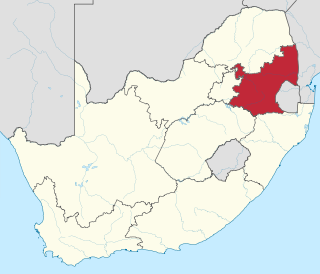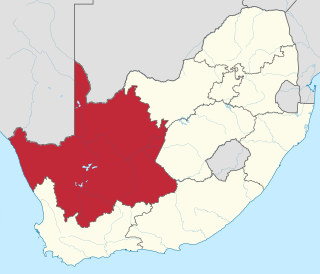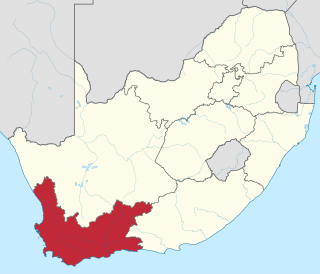Related Research Articles

Eastern Cape is one of the nine multi-member constituencies of the National Assembly of South Africa, the lower house of the Parliament of South Africa, the national legislature of South Africa. The constituency was established in 1994 when the National Assembly was established by the Interim Constitution following the end of Apartheid. It is conterminous with the province of Eastern Cape. The constituency currently elects 25 of the 400 members of the National Assembly using the closed party-list proportional representation electoral system. At the 2019 general election it had 3,363,161 registered electors.

Free State is one of the nine multi-member constituencies of the National Assembly of South Africa, the lower house of the Parliament of South Africa, the national legislature of South Africa. The constituency was established as Orange Free State in 1994 when the National Assembly was established by the Interim Constitution following the end of Apartheid. It was renamed Free State in 1999. It is conterminous with the province of Free State. The constituency currently elects 11 of the 400 members of the National Assembly using the closed party-list proportional representation electoral system. At the 2019 general election it had 1,462,508 registered electors.

Gauteng is one of the nine multi-member constituencies of the National Assembly of South Africa, the lower house of the Parliament of South Africa, the national legislature of South Africa. The constituency was established as Pretoria–Witwatersrand–Vereeniging in 1994 when the National Assembly was established by the Interim Constitution following the end of Apartheid. It was renamed Gauteng in 1999. It is conterminous with the province of Gauteng. The constituency currently elects 48 of the 400 members of the National Assembly using the closed party-list proportional representation electoral system. At the 2019 general election it had 6,381,220 registered electors.

KwaZulu-Natal is one of the nine multi-member constituencies of the National Assembly of South Africa, the lower house of the Parliament of South Africa, the national legislature of South Africa. The constituency was established in 1994 when the National Assembly was established by the Interim Constitution following the end of Apartheid. It is conterminous with the province of KwaZulu-Natal. The constituency currently elects 41 of the 400 members of the National Assembly using the closed party-list proportional representation electoral system. At the 2019 general election it had 5,524,666 registered electors.

Limpopo is one of the nine multi-member constituencies of the National Assembly of South Africa, the lower house of the Parliament of South Africa, the national legislature of South Africa. The constituency was established as Northern Transvaal in 1994 when the National Assembly was established by the Interim Constitution following the end of Apartheid. It was renamed Northern in 1999 and Limpopo in 2004. It is conterminous with the province of Limpopo. The constituency currently elects 19 of the 400 members of the National Assembly using the closed party-list proportional representation electoral system. At the 2019 general election it had 2,608,460 registered electors.

Mpumalanga is one of the nine multi-member constituencies of the National Assembly of South Africa, the lower house of the Parliament of South Africa, the national legislature of South Africa. The constituency was established as Eastern Transvaal in 1994 when the National Assembly was established by the Interim Constitution following the end of Apartheid. It was renamed Mpumalanga in 1999. It is conterminous with the province of Mpumalanga. The constituency currently elects 15 of the 400 members of the National Assembly using the closed party-list proportional representation electoral system. At the 2019 general election it had 1,951,776 registered electors.

Northern Cape is one of the nine multi-member constituencies of the National Assembly of South Africa, the lower house of the Parliament of South Africa, the national legislature of South Africa. The constituency was established in 1994 when the National Assembly was established by the Interim Constitution following the end of Apartheid. It is conterminous with the province of Northern Cape. The constituency currently elects five of the 400 members of the National Assembly using the closed party-list proportional representation electoral system. At the 2019 general election it had 626,471 registered electors.

North West is one of the nine multi-member constituencies of the National Assembly of South Africa, the lower house of the Parliament of South Africa, the national legislature of South Africa. The constituency was established in 1994 when the National Assembly was established by the Interim Constitution following the end of Apartheid. It is conterminous with the province of North West. The constituency currently elects 13 of the 400 members of the National Assembly using the closed party-list proportional representation electoral system. At the 2019 general election it had 1,702,728 registered electors.

Western Cape is one of the nine multi-member constituencies of the National Assembly of South Africa, the lower house of the Parliament of South Africa, the national legislature of South Africa. The constituency was established in 1994 when the National Assembly was established by the Interim Constitution following the end of Apartheid. It is conterminous with the province of Western Cape. The constituency currently elects 23 of the 400 members of the National Assembly using the closed party-list proportional representation electoral system. At the 2019 general election it had 3,128,567 registered electors.
Bhekizizwe Abram Radebe is a South African politician who has been a member of the National Assembly of South Africa from the Free State since 1999. He is a member of the African National Congress.
Mziwamadoda Uppington Kalako is a South African politician who represented the African National Congress (ANC) in the National Assembly from 1999 to 2009 and from 2014 to 2019. He was elected in the 1999 general election and re-elected in 2004. After a hiatus from the legislature, he returned in the 2014 general election, ranked second on the ANC's provincial party list for the Western Cape. He also served as the ANC's whip in the Portfolio Committee on Communications and Digital Technologies from 2014 to 2015.
Hlengiwe Christophina Mgabadeli is a South African politician who represented the African National Congress (ANC) in the National Assembly from 2004 to 2014. During her second term in the assembly, from 2009 to 2014, she represented the KwaZulu-Natal constituency and chaired Parliament's Joint Standing Committee on Defence.
Lewis Paul Musawenkosi Nzimande is a South African politician who represented the African National Congress (ANC) in the National Council of Provinces from 2009 to 2019. Before that he served in the National Assembly from 1999 to 2009.
Eugene Nhlanhla Nqaba Ngcobo is a South African politician and scientist who represented the African National Congress (ANC) in the National Assembly from 2004 to 2014. He was first elected to his seat in 2004 and was elected to a second term in 2009. During his second term, he chaired the Portfolio Committee on Science and Technology. He is a scientist by profession: he completed his MSc at Sofia University and completed a Ph.D. in nuclear reactor physics at Cambridge University.
Monontsi Joseph George Mzondeki is a South African politician and businessman who represented the African National Congress (ANC) in the National Assembly from 1999 to 2009. During that period, he retained business interests; in 2006, for example, he acquired a stake in President Steyn Gold Mines through a black economic empowerment deal. In the 2014 general election, he stood for election to the Free State Provincial Legislature, but he was ranked 27th on the ANC's provincial party list and did not secure a seat.
Peter Alroy Charles Hendrickse is a South African politician who represented the African National Congress (ANC) in the National Assembly from 1994 to 2009. During apartheid, he represented the Labour Party, which was led by his father, Allan Hendrickse.
Nkosinathi Benson Fihla is a South African politician and former anti-apartheid activist who represented the African National Congress (ANC) in the National Assembly from 1994 to 2013. He subsequently served as Mayor of Nelson Mandela Bay Metropolitan Municipality from March 2013 until May 2015. Fihla first joined the ANC in 1954 through its Youth League and he was imprisoned on Robben Island from 1964 to 1978 for his work with Umkhonto we Sizwe.
Richard Sibusiso Ntuli is a South African politician who represented Gauteng in the National Assembly from 1999 to 2009. He was first elected as a member of the Democratic Party (DP), later the Democratic Alliance (DA), but he crossed the floor to the African National Congress (ANC) in 2005.
Lanval Roderick Robin Reid is a South African politician who represented the African National Congress (ANC) in the National Assembly from 2004 to 2009. He was elected to his seat in the 2004 general election and served on the Portfolio Committee on Sports and Recreation. Prior to his election he had been a regional organiser for the ANC in the Southern Cape.
Jonathan Doneley Arendse is a South African politician who represented the African National Congress (ANC) in the National Assembly from 1994 to 2009. He was elected to his seat in the 1994 general election, South Africa's first post-apartheid election, and he gained re-election in 1999 and 2004; he represented the Western Cape constituency. He was Acting Chairperson of the Portfolio Committee on Environmental Affairs in 2003.
References
- 1 2 3 4 Engelbrecht, Leon (21 November 2008). "'Benji' Ntuli elected PCOD chair". defenceWeb. Retrieved 9 April 2023.
- ↑ "General Notice: Notice 1319 of 1999 – Electoral Commission: Representatives Elected to the Various Legislatures" (PDF). Government Gazette of South Africa . Vol. 408, no. 20203. Pretoria, South Africa: Government of South Africa. 11 June 1999. Retrieved 26 March 2021.
- ↑ "General Notice: Notice 717 of 2004 - Electoral Commission – List of Names of Representatives in the National Assembly and the Nine Provincial Legislatures in Respect of the Elections Held on 14 April 2004" (PDF). Government Gazette of South Africa . Vol. 466, no. 2677. Pretoria, South Africa: Government of South Africa. 20 April 2004. pp. 4–95. Retrieved 26 March 2021.
- ↑ "Election of Chairperson; Castle of Good Hope Annual Report 2007/08; ARMSCOR 2007/2008 Annual Report: briefing". Parliamentary Monitoring Group. 17 November 2008. Retrieved 9 April 2023.